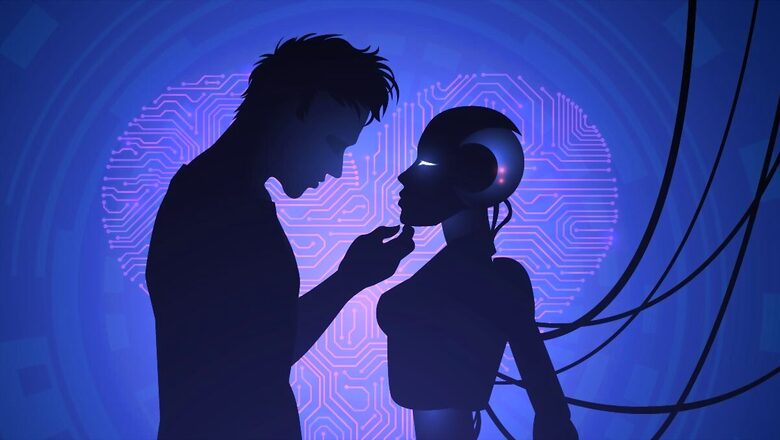
views
In this article, we will explain how AI and robotics may transform and redefine human intimacy in the coming future.
As AI continues to advance, the possibility of robot relationships inches closer to reality. AI is getting smarter, robots are becoming more human-like, and sex with machines may be just around the corner. As artificial intelligence continues its steady march into our lives, many experts predict that AI could fundamentally transform one of the most human of experiences: relationships and intimacy.
How Far Are We from Robot Relationships?
For now, human-level AI remains mostly in the realm of science fiction. While virtual assistants like Siri or Alexa can understand basic commands and queries, they lack the general intelligence needed for complex emotional relationships. Though robot relationships seem far-fetched, as technology improves, artificial companions could provide lonely or isolated individuals with social and emotional support. For people struggling with human interaction, robots may offer a way to experience intimacy and affection without anxiety or judgement.
AI companions are designed to simulate emotional intimacy. They can engage in lifelike conversations, recognize and respond to your emotions, even anticipate your needs. Some people find solace in the unconditional positive regard an AI can provide. However, AI cannot replicate the depth and nuance of human emotions and experiences. An AI may express empathy, but it does not truly feel it.
While interacting with an empathetic and caring AI could help meet some basic human needs for connection, AI cannot replace human intimacy. Humans crave the depth of understanding, compassion, and shared experiences that come from relationships with other living, breathing beings. AI cannot provide the warmth, vulnerability, and spontaneity present in human interactions. While fully sentient robot partners remain in the realm of science fiction, AI and robotics will likely transform how we experience relationships and intimacy in the coming decades.
Future of Physical Intimacy with Machines
As AI and robotics advance, sex robots are becoming more sophisticated and lifelike. Some models are equipped with heaters to maintain a warm body temperature, and have sensors to detect touch and movement. They can carry on basic conversations, and even simulate orgasms.
Many people view sex robots as a safe way to explore their sexuality or gain experience without the risks of real relationships. However, others argue they promote the objectification of women and normalize abusive behaviour. There are also concerns about their impact on human relationships and psychological well-being.
- Physical Intimacy Without Commitment: For some, sex robots represent an opportunity for physical intimacy without emotional commitment. They can fulfil sexual needs and desires without the demands of a human partner. This may appeal to people who have trouble finding partners, or those not interested in commitment.
- Normalizing Problematic Behaviour: Critics argue that sex robots can normalize objectification, abuse and rape culture. They are concerned that robots teach people to view women as objects for male pleasure. There are also worries they could fuel sex addiction or encourage other unhealthy behaviour.
- Impact on Human Relationships: Another concern is that sex robots may negatively impact human relationships and psychological health. Some experts fear they could reduce interest in human partners, increase social isolation, and lead to less meaningful connections between people. However, others argue that for certain groups like elderly or disabled individuals, sex robots could provide benefits and companionship.
The future of sex robots and their impact on society remains uncertain. As they become more advanced and widely available, we’ll gain a better understanding of how they influence human sexuality, relationships and well-being. With ongoing discussion and research, we can make more informed decisions about how these technologies should progress and be regulated. But for now, the possibilities they represent both excite and frighten us.
Impact of AI on Human Relationships
AI will undoubtedly transform how we form and maintain human relationships. There are many open questions about how AI may impact relationships and society’s views on intimacy. Some potential impacts include:
- Shifting views on commitment and monogamy. Relationships with AI could challenge traditional notions of fidelity and commitment to a single human partner.
- Changing social norms around sex and relationships. Interactions with highly human-like AI could normalize unrealistic or unhealthy attitudes about relationships, objectification, or consent.
- Increasing isolation and loneliness. Reliance on AI for emotional support and physical intimacy may reduce motivation to pursue human relationships, leading to greater isolation.
- Questions about ethics and consent. There are unresolved questions around the ethics of AI that are designed to have intimate or romantic relationships with humans that closely resemble human relationships.
The rise of AI will likely lead to a re-evaluation of human relationships and a re-defining of intimacy. With openness, care and consideration of ethical concerns, AI may enhance human relationships rather than replace them. But ultimately, human connection is irreplaceable, and should be nurtured. Maintaining a balanced and healthy perspective will help society adapt to these changes in a way that complements rather than competes with human intimacy.
So, while it may be tempting to dismiss the idea of robot love as science fiction, the reality is that AI and sex tech are coming together fast. You could find yourself face to face with your perfect digital partner, one custom-made to fulfil your every fantasy and emotional need. Whether that fills you with excitement or dread, this brave new world of artificial intimacy is hurtling toward us. The future is now, and it’s time to start asking yourself some tough questions about what you really want in a relationship — and whether a robot could ever truly satisfy you.




















Comments
0 comment